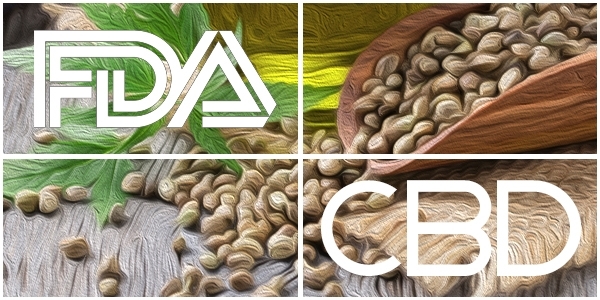CBD and FDA have had their differences. However, as of recently, the two parties might have finally figured things out, and from here, and it’s interesting to see how their relationship could influence the cannabis industry and the medical landscape as a whole.
The FDA’s first approval of a cannabis-based drug
On June 25th, the FDA announced its first approval of a cannabis-derived drug called Epidiolex for the treatment of epileptic seizures. It’s produced by GW Pharmaceuticals and its central ingredient is CBD.
“this is the first FDA-approved drug that contains a purified drug substance derived from marijuana,” FDA states itself.
Epidiolex can now be used to treat Lennox-Gastaut syndrome and Dravet syndrome – conditions where traditional medications have fallen short.
This is great news for many cannabis start-ups which have been struggling to figure out authorities’ equivocal stance on CBD and cannabis as a whole. There have been many CBD products on the market, but never a CBD drug, even though the difference has to do mostly with regulations and might be bigger on paper than in reality.
However, it’s important that cannabis companies know which lane this greenlight is for. The approval of Epidolex “is not an approval of marijuana or all its components,” FDA commissioner Scott Gottlieb says in a press release.
The DEA
However, there’s one major obstacle remaining – the DEA. Because the agency classifies CBD as a Schedule I substance, or in other words it considers its effects non-medicinal, Epidiolex can’t be put on the U.S. market unless the DEA reclassifies CBD.
“The FDA prepares and transmits… a medical and scientific analysis of substances subject to scheduling, like CBD, and provides recommendations to the Drug Enforcement Administration (DEA) regarding controls under the [Controlled Substances Act],” the FDA has previously stated, hinting that it will recommend that CBD be rescheduled.
Despite the obscurity which surrounds the issue, there’s every hope that CBD will jump through all of bureaucracy’s hoops. Prior to the FDA’s official decision, a press officer for the DEA confirmed that the agency will respond accordingly to this change:
“If they [the FDA] on June 27 announce that they’re approving Epidiolex, absolutely we’ll go into a different schedule. There’s no ifs, ands, or buts about it,’ the press officer stated.
This process of reclassification takes 90 days.
The FDA and CBD
Nevertheless, this news doesn’t mean the FDA have let their guard down. It notes that it will still “take action” against illegal CBD products making “serious, unproven medical claims.”
In fact, such claims were the source of their CBD’s bad reputation in the FDA officials’ eyes in the first place. On October 31 last year, the FDA sent a warning letter to four CBD distributors, forbidding them from stating that their products ‘’prevent, diagnose, treat, or cure cancer without the evidence to support these outcomes,’’ warning them that such marketing strategies are in violation of federal law. The four companies are Stanley Brothers Social Enterprises LLC, Natural Alchemist, Greenroads Health and That’s Natural! Marketing and Consulting.
The future of CBD and the FDA
This is certainly a major win for the cannabis industry and patients worldwide.
‘’This approval is definitely going to encourage other companies to investigate [other cannabis] compounds for different diseases, from pain to Alzheimer’s to multiple sclerosis to Tourettes. Basically a whole spectrum of diseases,”says Stephanie Yip, an analyst at Informa Pharma Intelligence.
GW Pharmaceuticals has already started exploring other CBD-derived drugs which could treat brain cancer and schizophrenia.
However, if CBD’s and the FDA’s differences have been smoothed out, the same can’t be said for cannabis and the DEA.
References:
- Commissioner, O. O. (n.d.). Press Announcements – FDA approves first drug comprised of an active ingredient derived from marijuana to treat rare, severe forms of epilepsy. Retrieved from https://www.fda.gov/newsevents/newsroom/pressannouncements/ucm611046.htm
- Commissioner, O. O. (n.d.). Press Announcements – Statement by FDA Commissioner Scott Gottlieb, M.D., on the importance of conducting proper research to prove safe and effective medical uses for the active chemicals in marijuana and its components. Retrieved from https://www.fda.gov/newsevents/newsroom/pressannouncements/ucm611047.htm
- Hatmaker, T. (2018, June 25). With CBD, marijuana-based medicine gets its first greenlight from the FDA. Retrieved from https://techcrunch.com/2018/06/25/what-is-cbd-fda/
- Mansur, K., Jones, W. S., Christensen, B., & OCC. (2017, November 02). FDA Warns CBD Oil Companies to Stop Selling CBD. Retrieved from https://www.occnewspaper.com/fda-warns-cbd-oil-companies-stop-selling-cbd/
- Chen, A. (2018, June 29). Here’s what’s next now that the FDA has approved a cannabis drug for seizures. Retrieved from https://www.theverge.com/2018/6/29/17518424/epidiolex-cbd-cannabis-fda-drugs-policy-law-health










